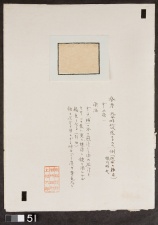Difference between revisions of "Zumi (Toringo Crab) - center (51 C)"
Jump to navigation
Jump to search
(username removed) |
(username removed) |
||
| Line 1: | Line 1: | ||
| − | {| class="wikitable" | + | [[[SliderGallery rightalign|Uemura_04-16-2009_051.jpg~Normal]]]{| class="wikitable" |
|- | |- | ||
! scope="row"|Museum number | ! scope="row"|Museum number | ||
Revision as of 10:29, 8 June 2013
| Museum number | 51 |
|---|---|
| Uemera number / title | 一; 櫨染 廿五 "Haze-some 25" |
| Folder location | 1st shelf |
| Sample location | center (51 C) |
| Fiber type | silk |
| Color | beige |
| Dyestuff (Japanese common name) | 桷 : Zumi |
| Dye (English common name) | Cherry Apple/Toringo Crab |
| Dyestuff (botanical name) | Malus toringo (Siebold) Siebold ex de Vriese |
| Plant part | trunk /dried (?) |
| Dyestuff extraction | boiled in water |
| Auxiliary agent in dye bath | - |
| Mordant | ash water |
| Other auxiliary agent | - |
| Uemera's notes | One of the dyeing techniques, which had been used since the 8th century AD in Japan. If the dyed fabric would be further mordanted with iron, the resultant color would be dark brown. Without any use of iron mordant or ash water, the dyed color would be pale yellow.
"徳川時代近世の雑染". |
| Uemera's date | Kyoto Murasakino |
